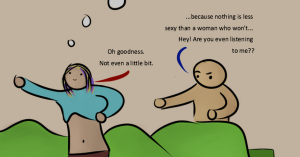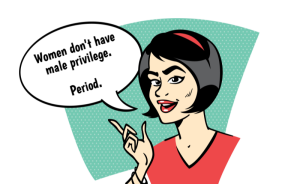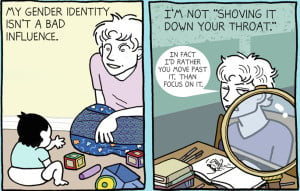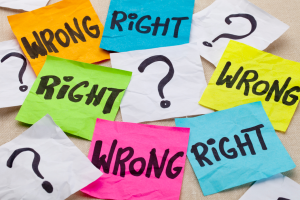
A sad person gazing out a window with a hand on their chin. Source: Img Kid
Depression is a drag. Everyone who has it experiences it differently, but we all agree that it sucks.
Sometimes, however, I wonder if people who don’t have it understand – like really truly understand – just how overwhelmingly painful it is.
For example, while it seems that people most commonly use the term to express fleeting feelings of sadness or disappointment, depression is actually a chronic physical illness with symptoms that are mostly invisible.
And although we’ve come a long way in our ability to treat it, we still don’t really know what causes it or why treatments work and don’t work.
It’s an exasperating disease to live with because being sad or frustrated or sleepless or numb for long, repetitive periods of time is exhausting – especially when you can’t prove to anyone that you’re really sick.
Even if your depression is manageable enough for you to leave the house, it can affect everything in your life.
It can interfere with your productivity, or even just the way you seem to your superiors at work – which has consequences for your performance reviews and ultimately the stability of your employment.
It can make your loved ones and friends want to be around you less because many people dislike the kind of negativity depressed people can become steeped in.
In its worst form, depression can lead to death. It’s a serious and draining disease to live with.
In a broad sense, fortunately, having depression doesn’t make you quite the social pariah it used to.
Diana Morales, vice president of public education at Mental Health America, started a survey in 1996 and found that “only about 38% of people viewed depression as a real health problem. But when they finished the survey in 2006, 72% of people viewed depression as a real health problem.
We’ve made good progress in de-stigmatizing having depression, but we haven’t made great strides in de-stigmatizing actually acting like you have depression – which most of us can’t help but do.
A simple Google search for “people with depression are selfish,” for example, yielded 1.3 million results.
Just like you can’t stop a headache with the power of your mind, most of us with depression are stuck with our symptoms, even if we are managing our depression with medication or other techniques.
While it’s wonderful that we’ve begun to fight the misinformation and prejudice surrounding depression, we’ve got a ways to go when it comes to compassionately and lovingly treating people with depression like they have a serious disease.
“Awareness” is great, but at the end of the day what I need is to be surrounded by people who actually understand my illness and know how to support me.
So here’s a guide to how to support a loved one with depression.
1. Don’t Ever Say ‘You’re Too Much’
When someone with depression is told “you’re too much,” especially from someone close to them, it can send them spiraling into guilt and anxiety and crushing sadness.
People with depression often have distorted ideas about how loved and supported they are, so hearing “I can’t deal with you” or variations on that theme from someone they love and trust can mean they generalize that sentiment to everyone close to them.
Imagine for a moment hearing “you’re too much for me” from every single loved one in your life. That’s what depression does to you. It makes you feel like a burden to the world.
This doesn’t mean that you need to be a constant source of emotional support for a depressed person. It’s not your job to take care of anyone else’s mental health.
A good way to take care of yourself without sending your depressed loved one spiraling is to say things like “I need not to be the only one you talk to about this stuff” or to address specific behaviors that you would like them to stop or change.
Being positive and encouraging is also helpful: “I’d love if you went on a short walk while I finish up this e-mail to my boss. I’m so proud of you for taking care of yourself, and I appreciate that you are committed to helping me feel supported as well!”
2. Do Not Shame People for Being Negative
Depression remakes the world into a landscape of negativity.
For example, something that happens for me during a depressive episode is that I can “connect” better to negative feelings than positive ones.
If my boss praises me at work, trying to experience a positive emotion of pride or gratitude feels like pretending. I have a hard time experiencing the positive emotions usually associated with praise when I’m depressed.
If someone criticizes me, though, anger, frustration and guilt are much easier to access.
Depressed people aren’t simply choosing to see the negatives and ignore the positives. The positives are as inaccessible to us as junk food in a vending machine when you have no quarters. We are really, truly unable to access positive feelings.
If the negativity is bumming you out, focus on what you want out of interactions.
Ask things like “Did something nice happen to you today?” Or deflect essays on what went wrong with their day with questions like, “Your hair looks beautiful today! Did you do it differently?”
Something that I find to be helpful is acknowledging that for people with depression, there are some days when, legitimately, nothing feels good for them. So, if you need a break from the Depression train, make it about you.
Don’t act like they need to try to find positivity where there is none. Tell them you need positivity so you’d like to talk about something positive, even if they don’t have anything positive going on.
And if they absolutely can’t redirect, take a break to surround yourself in the positivity you need and come back later.
3. Do Help Them Adhere to Medication Routines If You Can (But Don’t Question Their Medical Decisions)
Sometimes taking medication regularly is incredibly important.
Sometimes, I’m on a medication that makes my soul feel numb and my behavior and affect (outwardly) are pleasant and calm, but I feel like I’m living my life in a mildly depressing fish bowl.
Times like that are times when I want my loved ones to say, “Oh my god, that sounds awful. Yes, I think it’s a good idea for you to talk to your doctor about transitioning off your medication.”
The only “rule” about medication that should ever be enforced by a loved one is that if you are thinking of harming yourself or others, you get help immediately.
Anything else – want to switch to a new doctor, want to stop taking a medication that seems like it’s helping, want to take an extra anxiety pill – these are decisions you must support.
4. Do Understand That Depression Doesn’t Mean ‘Sadness’
Depression is a condition with a variety of symptoms – fatigue, disordered thinking, sleep problems. These are all symptoms of depression.
Irritability is a very common symptom, for example, and rarely are people who experience this symptom extended any sympathy.
Naturally, it’s hard to be compassionate if someone is grumping at you – and naturally, adults can (to some extent) control their own behavior (so you shouldn’t feel that you have to tolerate bad behavior because someone has depression), but irritability from depression can be as hard to control as sadness or insomnia.
Validation is as good a tool as there is for dealing with depression manifesting as irritability.
While not allowing someone to speak to you in a way you don’t want, you can validate their feelings of frustration or general malaise. I never get tired of hearing “That sounds so hard. I’m so sorry you’re feeling frustrated.”
5. Do Validate, Validate, Validate
Validation isn’t just a good tool for dealing with irritability, it’s a good tool for dealing with every aspect of having a loved one with a chronic illness.
Logic will not help.
Someone with depression is not living in the same universe as you. The laws that govern your universe do not exist in theirs.
It can be incredibly frustrating to have people act like what you are experiencing is not real, or is wrong, or is not reality.
I desperately wish I could believe myself when I say “my friends think I’m valuable and worth spending time with” when I’m having a depressive episode, but for me, at that time, saying that sounds as silly as saying “my eyebrows are the size of elephants.”
It can be very difficult to explain this alternate reality to someone who does not have mental illness. Please try to understand that rational thinking will not work because logic literally doesn’t exist in the universe we currently inhabit.
***
Having depression is exhausting.
My depression is well-managed, and I still have very bad days. But even on my good days, I spend a lot of time and energy managing my mood, my sleep, my diet, my activity level, and my relationships so that I can continue to function.
It takes effort, patience, and compassion to love someone with depression. I don’t think anyone would argue that it’s easy.
But we deserve love and companionship, too.
We need your patience, your compassion, and your love – even more when we’re having a difficult day or week or month. We know it’s hard. We know it’s not fair. But we also love you, value you, and appreciate your support very, very much.
I feel incredibly lucky to have people in my life who are able to support me in the ways I have mentioned above. It takes a village to kick depression’s ass.
[do_widget id=”text-101″]
Wiley Reading is a Contributing Writer at Everyday Feminism. Wiley is a New Jersey-born artist, writer, environmentalist, and social justice advocate located in Burlington, VT. He works as a community health worker for the Greater Burlington YMCA, and writes for Disrupting Dinner Parties, a small collective feminist blog. Follow him on Twitter @wreadinggo.
Read this article in Slovak language HERE.
Search our 3000+ articles!
Read our articles about:
Our online racial justice training
Used by hundreds of universities, non-profits, and businesses.
Click to learn more




















